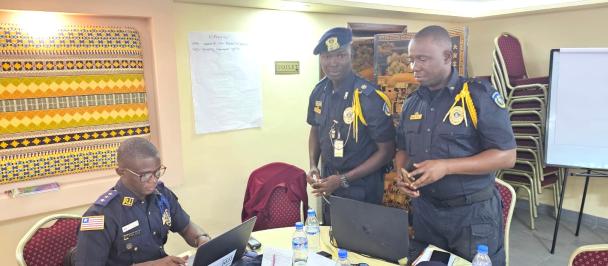The solar power installation will supply offices of the Liberia Immigration Service, the Liberia National Police, all line ministries and agencies, as well as the immediate surrounding areas of the border post.
The Liberia – Sierra Leone border post at Bo Waterside, Sinje is now powered 24-hours a day by a state-of-the-art solar power installation supported by the Mano River Union (MRU) and UNDP.
The installation, powering offices of the Liberia Immigration Service, the Liberia National Police and other government agencies, as well as the immediate surrounding areas, is providing adequate, clean reliable energy to power immigration and security services at the border post.
“This solar power installation represents a shift to clean energy that is environmentally-friendly and reliable, and which should power greater efficiency in service delivery to keep the border safe, secure and open for trade,” said UNDP Deputy Resident Representative Violet Baffour.
Madam Baffour said the solar installation was a public good that must be properly maintained to provide efficient reliable services to cross border travelers and traders.
Reiterating the same message, the Mano River Union Secretary-General Amb. Medina A. Wesseh, Esq said; “We can’t have sustainable development when we don’t manage and protect what we have.”
The system comprises 96 solar panels which can generate up to 20KW of power, enabling the border post to use all regular office equipment – computers, printers, and copiers, as well as air conditioning.
“Now, we have current 24 hours and no longer have to use torch light to record passports at night,” said Major Saxon Tambo, Commander of Bo Waterside, and Chairman of the joint Liberia-Sierra Leone joint security team. “The bridge is now very well-lit making security patrols easier and deterring criminal activities and illegal border crossings by canoe at night.”
Prior to the solar power installation, the Bo Waterside border post had to give up critical immigration control equipment necessary for detecting document fraud that had been lying in disuse due to lack of electricity. It was transferred to Roberts International Airport in July 2019.
If properly maintained, the panels can keep generating power for up to 40 years, while the rechargeable and expandable lithium-ion batteries have a life span of up to 10 years.
“This is a lifetime investment that can boost border operations for years if it only it can be properly maintained,” said Paul Kollie, the Chief Executive Officer of Westcoast Energy Inc., the company that installed the system. He pledged to train officers at the border post to be able to maintain and solve problems that the system may encounter.
The system is managed online, and using a mobile app, to remotely troubleshoot problems. It logs all events such as system overloads, and collects real time data on greenhouse emissions generated by its operations.
In the event of a fire, it automatically shuts down to protect itself from destruction, stopping fire from spreading and destroying the buildings it is powering.
Emphasizing the need to care for and maintain the system properly in order to maximize the value the system is providing, Liberia Immigration Services, Director for Administration Lawrence Karnely said: “It is good when you have partners who can scratch your back, leaving you to worry about only scratching your stomach.”
He said the power was enabling officers to comfortably charge their phones and listen to radio.
UNDP urged the Government of Liberia to allocate adequate budgetary resources for the maintenance and sustainability of the solar lighting initiative.

 Locations
Locations




